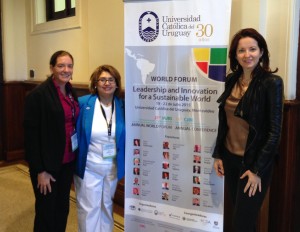Faculty Present at International Business Conference in Uruguay
T wo faculty members from Saint Peter’s University headed to Uruguay in July where they joined fellow educators from Jesuit universities from all over the world at the 2015 World Forum of The International Association of Jesuit Business Schools — an organization with more than 60 Jesuit universities globally.
wo faculty members from Saint Peter’s University headed to Uruguay in July where they joined fellow educators from Jesuit universities from all over the world at the 2015 World Forum of The International Association of Jesuit Business Schools — an organization with more than 60 Jesuit universities globally.
Marilu Marcillo-Gomez, Ph.D., assistant professor of business administration, Mary Kate Naatus, Ph.D., assistant professor of business and acting director of the Ignite Institute, and Naatus’ research partner Aleksandra Lacka, who serves on the local economy working group for the Ignite Institute, all presented at this year’s World Forum at the Catholic University of Uruguay. The conference featured academic paper presentations, sharing of best practices in business education and cross-cultural exchange and relationship building.
“This international conference is an excellent forum to feature all of the innovative programs and inter-disciplinary initiatives that Saint Peter’s faculty and students are engaged in to make significant community impacts,” explained Dr. Naatus. “It also allows us to connect with other Jesuit institutions from around the world and identify meaningful ways to be involved in this global network.”
This year’s theme was “Leadership & Innovation for a Sustainable World.” During the conference, international scholars presented a vision of how Jesuit universities must take a lead in addressing the most pressing global challenges. Dr. Marcillo-Gomez presented her paper titled “Collaborative Online International Learning Experience in Practice: Opportunities and Challenges,” which was about research findings from a collaborative virtual student project in partnership with a university in Mexico.
Dr. Naatus and Lacka presented their paper titled “Building Bridges in the Urban Local Economy: A Jesuit University Non-profit Partnership Model,” which proposes the model of the Ignite Institute — a strategic partnership between Saint Peter’s and its Jersey City-based non-profit partner Rising Tide Capital —as a model for community engagement and economic growth. In addition to Lacka, the paper was also co-authored by Alfa Demmellash and Mike Caslin of Rising Tide Capital and Kim Zeuli of the Initiative for a Competitive Inner City, a Washington D.C.-based think tank.
“It was great to see the interest both presentations generated and the impact those initiatives could have if replicated globally,” said Lacka.
Dr. Naatus recalled other local entrepreneur-focused initiatives presented by business schools from India and Brazil, which she said only proved how important it is to engage business students with local entrepreneurs.
“Such initiatives present a great opportunity for collaborations within the Jesuit business schools network to optimize their collective impact and to share learnings and best practices,” she added.
In participating and presenting their innovative research and initiatives, Dr. Naatus and Dr. Marcillo-Gomez and Lacka agreed that it not only enabled them to promote the great work the students and faculty are doing at Saint Peter’s, but that the World Forum is one of the best opportunities to build relationships with the global network of Jesuit business schools.
“Unlike other business conferences, this is a forum where our Jesuit identity is front and center, focusing on collective social impact and stakeholder value,” said Dr. Marcillo-Gomez. “Developing collaborations and sharing best practices is instrumental in optimizing our learnings and collective impact as a network.”
By the end of the conference, the experience had impacted them all both professionally and personally. They learned new classroom strategies to improve student engagement and learning outcomes, discovered potential global student and faculty exchange opportunities, established new international research partners and collaborations, discussed ways to connect Saint Peter’s students and alumni to the larger Jesuit network and learned how to make a larger global impact by collectively working for social justice and a more sustainable world with the larger Jesuit network.
For Dr. Naatus, it was particularly inspiring to see the unique impact that Jesuit business schools have globally.
“It validates the work we are doing in engaging the local entrepreneurial community,” she added. “We are bringing back specific strategies of growing, expanding and funding these community-engaged and globally-connected programs that will advance not only our students’ experience, but also Saint Peter’s impact on our larger urban community.”
